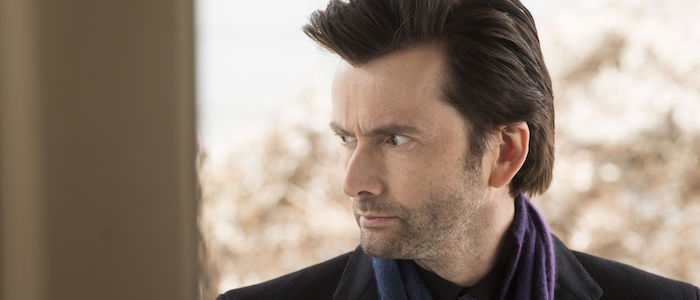How ‘Jessica Jones’ Uses Words as Weapons
In its second season, Jessica Jones has gotten angrier and messier. Through its exploration of Jessica’s tragic past, the show has remained an unflinching look at trauma and healing — how one gifted woman processes years of abuse, abandon, and plain old misogyny.
Jessica uses multiple coping mechanisms to deal with this trauma, among them binge drinking and physical violence. But she also shields herself with words, often vulgar, cutting words. It’s tempting to read these caustic insults as a reflex, a defense Jessica has forgotten she even puts up to keep people from getting too close. Yet her use of and reaction to language is quite intentional, and it’s part of what makes Jessica Jones such an interesting superhero.
Sharp Sentences
“People do bad shit,” Jessica says in the pilot episode. “I just avoid getting involved with them in the first place.” This colorful quote serves as a sort of mission statement for the character. She’s not interested in vulnerability or real relationships, and she’ll be rude about it if she has to be. Jessica’s blunt, biting choice of words was written into her story from the beginning. The first issue of Alias, the comic book series which introduced her, has “fuck” printed three times on the opening page.
This character quirk serves a couple purposes. On the most basic level, it communicates that Jessica is one tough broad — the swearing is there to match all the drinking and brawling. On another, it speaks to Jessica’s deeply ingrained intimacy issues, which have only hardened as she lost her family and control of her body many times over. But Jessica isn’t just lashing out in grief; she’s aiming to bruise. Language is one of her many weapons, and it’s one she picked up from her greatest abusers.
Mommie Dearest
Jessica’s first abusers, her doctors, hurt her with actions, not words. But her adoptive mother Dorothy Walker has quite a way with them. Dorothy seems like a sunny, sweet woman at first glance. She smiles broadly when her adoptive daughter “Jessie” shows up unannounced at her casting agency in the seventh episode of the first season. Even as Jessica lays into her, demanding she stay away from her famous biological daughter Trish, Dorothy remains strangely perky. But she knows when to drop the facade and strike. “Need a better tagline,” she quips while Jessica threatens her. Then she casually drops the real gut punch: “Taking you in was the worst decision of my life.”
That’s just a glimpse into what Jessica’s adolescence looked like. We later learn from flashbacks that Dorothy only took Jessica in to make herself look charitable and cover up a tabloid story about Trish. She never treated Jessica like her own child, just a piece of her publicity machine. She abused even the daughter she proudly claimed, though we don’t really see the physical abuse Trish endured onscreen. We mainly hear the screamed insults.
Kilgrave’s Smile
Jessica’s most sadistic abuser, the one who looms over the entire series, uses his words in a more frightening, devastating way. Kilgrave, a British man with sinister charm and a penchant for purple suits, has little use for Jessica’s f-bombs or Dorothy’s passive aggression. He can end lives with a simple sentence.
The words that Kilgrave says are clear and direct. He only occasionally growls or shouts them, preferring to intone them in a calm, steady voice. But they knock the breath out of your body. “You’d like to invite me in.” “Go to the blender, lower your right hand in there.” “If I’m not back within two hours, please remove the skin from each other’s faces.” Anyone who hears these words knows their power, for Kilgrave’s commands are impossible to refuse. And he is always commanding, never asking.
One of Kilgrave’s most innocuous yet insidious orders is “smile.” It’s repeated throughout the first season, and the name of the finale. Any woman knows the loaded meaning of “smile.” It’s a seemingly simple, even friendly request uttered by so many men in public spaces. It has many variations, like “Smile, gorgeous” or “You’re so pretty, why don’t you smile?” But it’s not really a request — it’s meant the way Kilgrave means it, as a command.
As Libby Hill wrote in The Los Angeles Times, “Telling a woman, particularly a stranger, to smile presumes unearned familiarity. Worse, it implies a right to dictate behavior.” Hill and many others praised the show for using this single word as a commentary on street harassment and real-life sexism, and this commentary builds to a cathartic climax where Jessica, at Kilgrave’s request, smiles and then promptly snaps his neck. Jessica took a word that had been dogging her for 13 episodes, that has been dogging women for ages, and literally drained it of its power.
While Kilgrave is obviously more monstrous, he and Jessica both use language in harmful ways. Their delivery is completely different, but they both understand the weight of words. The difference lies in who they’re trying to harm. Kilgrave is pure evil, so his victims are not limited in scope. He’ll torture anyone who gets in his way, anyone who gets in between him and Jessica, or anyone who bores him. Jessica is a little more focused. Although she’ll casually burn a stranger on the street or one of her few friends, she saves her most pointed insults for those threatening or abusing her — and where words fail, her fist does not.
Continue Reading How ‘Jessica Jones’ Uses Words as Weapons >>
The post How ‘Jessica Jones’ Uses Words as Weapons appeared first on /Film.
from /Film http://ift.tt/2FHTPuk



No comments: